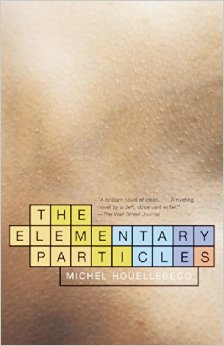 The French author Michel Houellebecq has had an interesting year so far. On the same day of the attack on the Charlie Hebdo offices, his caricature was featured on the front cover of that magazine. This was also the day his new novel Submission was published, which takes place in the year 2022 where the French populace elects a Muslim political party that brings the country under Islamic law. It seems like as good a time as any to take a look at the 2002 novel that brought Houellebecq to international attention, The Elementary Particles.
The French author Michel Houellebecq has had an interesting year so far. On the same day of the attack on the Charlie Hebdo offices, his caricature was featured on the front cover of that magazine. This was also the day his new novel Submission was published, which takes place in the year 2022 where the French populace elects a Muslim political party that brings the country under Islamic law. It seems like as good a time as any to take a look at the 2002 novel that brought Houellebecq to international attention, The Elementary Particles.
The Elementary Particles is a novel about ideas, and is especially concerned with how scientific progress intertwines with the human condition. Much like JG Ballard’s later works, or Aldous Huxley’s Brave New World. In fact, Huxley’s work is discussed at length by the characters.
“His writing is pretentious and clumsy, his characters are bland ciphers, but he had one vital premonition: he understood that for centuries the evolution of human society had been linked to scientific progress and would continue to be.”
The main concern of the book, however, is the emptiness of modern society, and how it alienates people from each other, leaving them flailing aimlessly for meaning. It’s no wonder the first English translation changed the title to Atomised.
The story is about the half brothers Michel and Bruno. Their mother is an intelligent and adventurous but very selfish baby boomer obsessed with youth culture. She abandons the two sons she has by different men to their grandmothers, and they grow into very different people.
Michel grows up to be a brilliant and accomplished scientist, but is emotionally dead and completely incapable of forming relationships. Although he’s well liked, he’s can’t form lasting friendships. When his childhood friend Anabelle falls head over heels for him, he finds himself unable to return the feelings.
Male rats deprived of maternal contact during infancy exhibit serious disturbances in sexual behaviors, especially in mating rituals. If his life had depended on it (and, in a very real sense it did), Michel could not have kissed Anabelle.
Bruno, on the other hand, spends his entire life as a fat loser and grows into a failed writer who accomplishes nothing. He becomes obsessed with sex from the moment he hits puberty, but is constantly rejected by women. This leaves him to do little more than masturbate and go to prostitutes. He eventually gets married, but soon divorces his wife and abandons his own son.
“I knew from the start I was doomed. It wasn’t that I missed ‘life in Paris.’ I couldn’t have cared less about that — I’d always been completely miserable in Paris. It was just that I was attracted to every woman except my wife.”
Eventually, Michel finally finds himself able to enter a relationship Annabelle, and Bruno meets Christiane, a woman as obsessed with sex as he is. It seems like they both have a chance at happiness, but it proves to be fleeting. Christiane becomes crippled from necrosis of the coccyx and chooses to commit suicide rather than live life disabled, and Annabelle succumbs to uterine cancer. Bruno checks into a mental hospital to have his sex drive drugged away for the rest of his life, and Michel leaves France to devote himself to his research. In the Epilogue, we learn where Michel’s work leads mankind.
In the midst of the suicide of the West, it was clear they had no chance.
Youth, decay and death are major focuses in the novel. For example, Michel and Burno’s mother Jane spends all her time with young hippies up until her death.
“She wanted to stay young, that’s all…” said Michel, his voice tired and forgiving. “She wanted to be with young people — though certainly not her kids, who just reminded her that she was part of an older generation
From his childhood, Michel is terrified of death, and eliminating it is a major motivation of his research.
The unshakable conviction grew that nature, taken as a whole, was a repulsive cesspit. All in all, nature deserved to be wiped out in a holocaust — and man’s mission on earth was probably to do just that.
Sex and modern romantic relationships are another major focus of the book, and Houellebecq makes it very clear that he believes the sexual revolution of the 60s did far more harm than good. Bruno’s sexual and romantic failures are presented as symptoms of this harm.
As the lovely word “household” suggest, the couple and the family would be the last bastion of primitive communism in liberal society. The sexual revolution was to destroy these intermediary communities, the last to separate the individual from the market. The destruction continues to this day.
His sexual escapades also provide some much needed comic relief for as heavy and depressing as this book can get. His bumbling attempts at getting laid at a New Age retreat, where he also meets Christiane, and the acidic wit he throws at the people around him are very entertaining.
A handful of needle-dick dreamers stayed behind, spending their evenings in a tent gently strumming an out-of-tune guitar while their peers despised them. Bruno felt a keen sympathy for these young men. But in the absence of girls he could never hope to attract, he would happily — to quote a reader of Newlook he’d met in a cafe in Angers — “stick his knob in any available hole.”
The Elementary Particles is a biting, powerful and thoughtful critique of modern life, but it certainly isn’t for everyone. Science fiction fans may find the ideas too rooted in continental philosophy to gravitate to. Not to mention the book is very sad and depressing. The graphic sex, much of which is gross and off-putting rather than erotic, will turn off many readers as well. That said, I highly recommend this existential Science Fiction novel to whoever is willing to pick it up.
 Ben Arzate lives in Des Moines, Iowa. His fiction and poetry has appeared in Ugly Babies, Bizarro Central, Spoilage, The Mustache Factor, Twenty Something Press, and Keep This Bag Away From Children. He blogs at http://dripdropdripdropdripdrop.blogspot.com/
Ben Arzate lives in Des Moines, Iowa. His fiction and poetry has appeared in Ugly Babies, Bizarro Central, Spoilage, The Mustache Factor, Twenty Something Press, and Keep This Bag Away From Children. He blogs at http://dripdropdripdropdripdrop.blogspot.com/
Subscribe to Adventures in SciFi Publishing podcast on: iTunes | Stitcher Radio (Android users) | RSS | Website RSS |

















Speak Your Mind